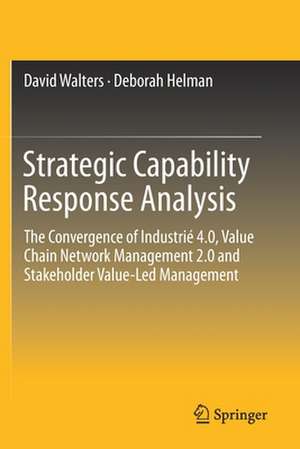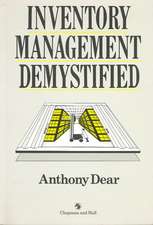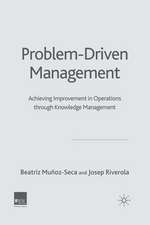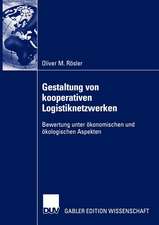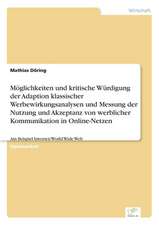Strategic Capability Response Analysis: The Convergence of Industrié 4.0, Value Chain Network Management 2.0 and Stakeholder Value-Led Management
Autor David Walters, Deborah Helmanen Limba Engleză Paperback – 27 dec 2020
| Toate formatele și edițiile | Preț | Express |
|---|---|---|
| Paperback (1) | 589.33 lei 6-8 săpt. | |
| Springer International Publishing – 27 dec 2020 | 589.33 lei 6-8 săpt. | |
| Hardback (1) | 738.06 lei 6-8 săpt. | |
| Springer International Publishing – 3 dec 2019 | 738.06 lei 6-8 săpt. |
Preț: 589.33 lei
Preț vechi: 693.34 lei
-15% Nou
Puncte Express: 884
Preț estimativ în valută:
112.77€ • 116.52$ • 93.81£
112.77€ • 116.52$ • 93.81£
Carte tipărită la comandă
Livrare economică 19 martie-02 aprilie
Preluare comenzi: 021 569.72.76
Specificații
ISBN-13: 9783030229467
ISBN-10: 3030229467
Pagini: 372
Ilustrații: XXXIV, 372 p. 140 illus.
Dimensiuni: 155 x 235 mm
Greutate: 0.57 kg
Ediția:1st ed. 2020
Editura: Springer International Publishing
Colecția Springer
Locul publicării:Cham, Switzerland
ISBN-10: 3030229467
Pagini: 372
Ilustrații: XXXIV, 372 p. 140 illus.
Dimensiuni: 155 x 235 mm
Greutate: 0.57 kg
Ediția:1st ed. 2020
Editura: Springer International Publishing
Colecția Springer
Locul publicării:Cham, Switzerland
Cuprins
Chapter 1. Introduction: The Changing and Challenging Business Environment of Industrié 4.0.- Chapter 2. Industry 4.0 “Connectivity and Capabilities”.- Chapter 3. Industry Dynamics.- Chapter 4. Changing Perspectives of Value and the Role of the “Agile/Rolling” Value Proposition and Marketing Implications.- Chapter 5. Performance - Performance Drivers and Strategic Value Builders.- Chapter 6. Profitability.- Chapter 7. Productivity.- Chapter 8. People - Managing Intra- and Inter-organisational Relationships.- Chapter 9. Protection - Sustainability and the Circular Value Chain Network: Changes and Challenges.- Chapter 10. Producibility.- Chapter 11. Strategic and Operational “Operations” Management.- Chapter 12. Marketing Considerations.- Chapter 13. Identifying and Responding to Future Opportunities.- Chapter 14. The Global Value Network Model: Changes and Challenges.- Chapter 15. The Future of the Value Competitive Performance Business Model.- Chapter 16. Performance Measurement.-Chapter 17. Industry 4.0+/What Could Industry 5.0 Bring?.
Notă biografică
David Walters BA (Alberta), MSc (Bradford), PhD (Cranfield) was an Honorary Adjunct Professor at the University of Technology Sydney. Prior to this post he was Professor of Management: Logistics and Supply Chain at ITLS, University of Sydney and subsequently an honorary professor. He has held posts at the Cranfield School of Management, Oxford University (Templeton College), Macquarie University and the Western Sydney University (Sydney Graduate School of Management). He has published several textbooks in business and marketing subjects, the most recent "Managing in the Value Chain Network" was published in 2012. He has published over 30 articles in academic journals. David Walters has teaching experience in a wide range of continents including North America, the Middle East, Europe, Asia, and Africa. In addition to his wide teaching experience he has acted as a consultant for many international companies. These have included: AWA, CSR, (Australia and New Zealand). British Oxygen Company, Coates, and notable retailing organizations; Harrods, Laura Ashley, the Kingfisher Group, Storehouse, Marks and Spencer, and Tesco.
Deborah Helman BA (Leicester), MPhil (Cranfield, PhD (Birmingham) is Professor of Sales and Marketing at the Keller Graduate School of Management., and Co-Managing Editor of the DeVry University Journal of Scholarly Research. Her research typically involves qualitative methods – focus groups, case study development in both the business and academic contexts. She is a member of the American Marketing Association.
Textul de pe ultima copertă
This book integrates Industrié 4.0, Value Chain Network Management 2.0, and Stakeholder Value-Led Management into a method offering organizations an opportunity to be more analytical when making strategic decisions for operations management activities. Strategic Capability Response Analysis embraces the value expectations of all stakeholders in a business enterprise and links them together with a demand-supply-response relationship. This convergence delivers a focused “agile-rolling-value proposition” that optimizes the expectations and the resources of its stakeholder constituents. The use of strategic capability response analysis considers the implications of the changing environment of value chain network management for the digital age. Industrié 4.0 has presented numerous opportunities across all industries to improve both the effectiveness of strategic decisions and the efficiency of their implementation to the network stakeholders. As Industrié 4.0 is changing the characteristicsof decision making, the proposed model considers the impact of alternative solutions on the core business model components of performance, profitability, productivity, producibility, partnerships and preservation. The book includes case studies to highlight current management problems and how this approach can be used to help resolve those issues.
Caracteristici
Showcases a powerful strategic option evaluation method that combines Industrié 4.0 and Value Chain Network Management 2.0 with Stakeholder Value-led Management Considers the changing environment that value chain management exists within as well as its long-term emphasis on stakeholder value A chapter containing relevant case studies concludes the book
